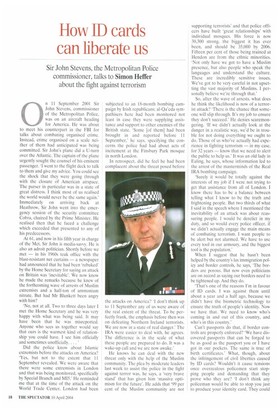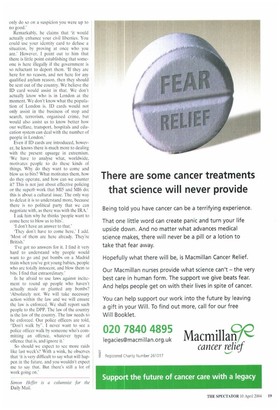How ID cards can liberate us
Sir John Stevens, the Metropolitan Police commissioner, talks to Simon Heifer about the fight against terrorism
0 n 11 September 2001 Sir John Stevens, commissioner of the Metropolitan Police, was on an aircraft heading for America. He was about to meet his counterpart in the FBI for talks about combating organised crime. Instead, crime organised on a scale neither of them had anticipated was being committed. Sir John's plane did a U-turn over the Atlantic. The captain of the plane urgently sought the counsel of his eminent passenger. 'I went to the flight deck to talk to them and give my advice, You could see the shock that they were going through with the closure of American airspace. The purser in particular was in a state of great distress. I think most of us realised the world would never be the same again.' Immediately on arriving back at Heathrow, Sir John went into the emergency session of the security committee Cobra, chaired by the Prime Minister. He realised then that he faced a challenge which exceeded that presented to any of his predecessors.
At 61, and now in his fifth year in charge of the Met, Sir John is media-savvy. He is also an adroit politician. Shortly before we met — in his 1960s teak office with the blast-resistant net curtains — a newspaper had announced that he had been 'rebuked' by the Home Secretary for saying an attack on Britain was 'inevitable'. We now know he made the remarks because he knew of the forthcoming wave of arrests of Muslim extremists and a half-ton of ammonium nitrate. But had Mr Blunkett been angry with him?
'No, not at all. Two to three days later I met the Home Secretary and he was very happy with what was being said. It may have been that he was misreported. Anyone who sees us together would say that ours is the warmest kind of relationship you could have. I see him officially and sometimes unofficially. .
Did the police know about Islamic extremists before the attacks on America? 'Yes, but not to the extent that 1 I September revealed. We were aware that there were some extremists in London and that was being monitored, specifically by Special Branch and MI5.' He reminded me that at the time of the attack on the World Trade Center, London had been
subjected to an 18-month bombing campaign by Irish republicans: al-Oa'eda sympathisers here had been monitored not least in case they were supplying assistance and support to other enemies of the British state. 'Some [of them] had been brought in and reported before 11 September,' he says, specifying the concerns the police had had about acts of incitement at the Finsbury Park mosque in north London.
In retrospect, did he feel he had been complacent about the threat posed before the attacks on America? 'I don't think up to 11 September any of us were aware of the real extent of the threat. To be perfectly frank, the emphasis before then was on defeating Northern Ireland terrorists. We are now in a state of real danger.' The IRA were easier to deal with, he agrees. The difference is in the scale of what these people are prepared to do. It was a wake-up call and we are now awake.'
He knows he can deal with the new threat only with the help of the Muslim community. The plea by moderate leaders last week to assist the police in the fight against terror was. he says, a 'very brave stand' that has given him .massive optimism for the future'. He adds that '99 per cent of the Muslim community are not
supporting terrorists' and that police officers have built 'great relationships' with individual mosques. His force is now 30,300 strong, the biggest it has ever been, and should be 35,000 by 2006. Fifteen per cent of those being trained at Hendon are from the ethnic minorities. 'Not only have we got to have a Muslim presence, but also people who speak the languages and understand the culture. These are incredibly sensitive issues. We've got to be very careful in not upsetting the vast majority of Muslims. I personally believe we're through that.'
So, after the wave of arrests, what does he think the likelihood is now of a terrorist attack? 'There is the chance that someone will slip through. It's my job to ensure they don't succeed.' He denies scaremongering. 'If we didn't actually look at the danger in a realistic way, we'd be in trouble for not doing everything we ought to do. Those of us who've actually had experience in fighting terrorism — in my case, for 32 years — know that we need to alert the public to help us.' It was an old lady in Ealing, he says, whose information led to the arrest of the masterminds of the Real IRA bombing campaign.
'Surely it would be totally against the interests of my job if I were not trying to get that assistance from all of London. I know there has to be a balance between telling what I know to be the truth and frightening people. But two thirds of what I said in the speech where I mentioned the inevitability of an attack was about reassuring people. I would be derelict in my duty, and so would every police officer, if we didn't actually engage the main means of combating terrorism. I want people to be alert but not alarmed. We have to use every tool in our armoury, and the biggest tool is the population.'
When I suggest that he hasn't been helped by the country's lax immigration policy and border controls, he says, 'The borders are porous. But now even politicians are on record as saying our borders need to be tightened up. And they do.
'That's one of the reasons I'm in favour of ID cards. I was against them until about a year and a half ago, because we didn't have the biometric technology to ensure the truth of people's identity. Now we have that. We need to know who's coming in and out of this country, and who's in this country.'
Can't passports do that, if border controls are properly enforced? 'We have discovered passports that can be forged to be as good as the passport you or I have got in our pockets. The same is true of birth certificates.' What, though, about the infringement of civil liberties caused by ID cards? Wouldn't it cause tensions once overzealous policemen start stopping people and demanding that they prove who they are? 'I don't think any policeman would be able to stop you just to produce your identity card. They could only do so on a suspicion you were up to no good.'
Remarkably, he claims that 'it would actually enhance your civil liberties. You could use your identity card to defuse a situation, by proving at once who you are.' However, I point out to him that there is little point establishing that some one is here illegally if the government is so reluctant to deport them. 'If they are here for no reason, and not here for any qualified asylum reason, then they should be sent out of the country. We believe the ID card would assist in that. We don't actually know who is in London at the moment, We don't know what the popula tion of London is. ID cards would not only assist in the business of stop and search, terrorism, organised crime, but would also assist us to know better how our welfare, transport, hospitals and education system can deal with the number of people in London.'
Even if ID cards are introduced, however, he knows there is much more to dealing with the present upsurge in extremism.
`We have to analyse what, worldwide, motivates people to do these kinds of things. Why do they want to come and blow us to bits? What motivates them, how do they operate, and how can we counter it? This is not just about effective policing or the superb work that MI5 and MI6 do: this is about a cultural issue. The only way to defeat it is to understand more, because there is no political party that we can negotiate with, as there was with the IRA..
I ask him why he thinks 'people want to come here to blow us to bits'.
'I don't have an answer to that.'
'They don't have to come here,' I add. 'Most of them are here already. They're British,' 'I've got no answers for it. I find it very hard to understand why people would want to go and put bombs on a Madrid train when you've got young babies, people who are totally innocent, and blow them to bits. I find that extraordinary.'
Is he afraid to use laws against incitement to round up people who haven't actually made or planted any bombs?
'Absolutely not. We will take necessary action within the law and we will ensure the law is enforced. We shall report such people to the DPP. The law of the country is the law of the country. The law needs to be enforced. Our police officers are told, "Don't walk by". I never want to see a police officer walk by someone who's committing an offence, whatever type of offence that is, and ignore it.'
So should we expect to see more raids like last week's? With a wink, he observes that 'it is very difficult to say what will happen in the future, and you wouldn't expect me to say that. But there's still a lot of work going on.'
Simon Heifer is a columnist for the Daily Mail.



































































 Previous page
Previous page